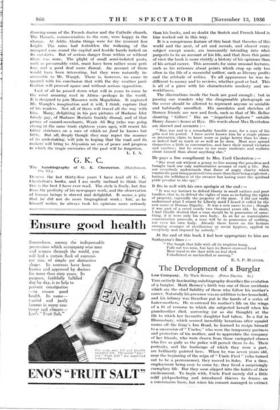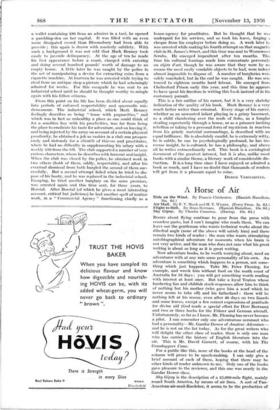The Development of a Burglar Low Company. By Mark Benney.
(Peter Davies. . 9s.) Tuts entirely fascinating autobiography describes the evolution of a burglar. Mark Benney's birth was one. of those accidents which are the chief liability of those who follow his mother's career. Naturally his presence was no addition to her household, and his infancy was therefore put in the hands of a series of foster-mothers. He re-entered his mother's life on the wings of a fit of remorse to which she subjected herself when his grandmother died, sorrowing (or so she thought) at the life to which her favourite daughter had taken. In a flat in Bloomsbury, which seemed incredibly luxurious after squalid rooms off the Gray's Inn Road, he learned to resign himself to a succession of " Uncles," who were the temporary partners and protectors of his mother, and to appreciate the company of her friends, who were drawn from those variegated classes who live as gaily as the police will permit them to do. Their portraits, and the landscape of which they were a part, are brilliantly painted here. When he was seven years' old, near the beginning of the reign of " Uncle Fred " (who twined out to be a permanence), they moved to Soho. For a time, employment being easy to come by, they lived a surprisingly exemplary life. But they soon slipped into the habits of their environment. To begin with, Uncle Fred merely did a little mild pickpocketing and introduced thieves to .fences on a commission basis,..but_when his consort managed. to extract a wallet containing £80 from an admirer in a taxi, he opened a gambling-den on her capital. It was filled with an even more dissipated crowd than Bloomsbury had been able to provide ; this again is drawn with masterly subtlety. With such a background it was not odd that Mark Benney took easily to juvenile delinquency. At the age of ten he made his first appearance before a court, charged with entering and doing several hundred pounds' worth of damage to an empty house. A little later he was caught by. the police in the act of manipulating a device for extracting coins from a cigarette machine. At fourteen he was arrested while trying to steal from an antique shop a picture which he had schemingly admired for weeks. For this escapade he was sent to an industrial school until he should be thought worthy to mingle again with his fellow citizens.
From this point on his life has been divided about equally into periods of enforced respectability and spasmodic mis- demeanour. The industrial school, which Mark Benney feelingly describes as being " tense with pugnacities," and which was in fact as unhealthy a place as one could think of for a sensitive boy with his proclivities, was far from being the place to eradicate his taste for adventure, and on leaving it, and being rejected by the army on account of a certain physical peculiarity, he obtained a job as cashier in a club run prosper- ously and riotously for a clientele of thieves and prostitutes, where he had no difficulty in supplementing his salarywith a weekly £10 *Om the till. The club supported a number of very curious characters, whom he describes with humour and insight. When the club was closed by the police, he obtained work in two others (both of them, oddly, respectable), and after his eventual dismissal from both burgled the second of them suc- cessfully. But a second attempt failed when he tried to dis- pose of his booty, and he was replaced in the industrial school. Escaping, he tried another burglary on the same premises, was arrested again and this time sent, for three years, to Borstal. After Borstal (of which he gives a most interesting account, critical but judicious) he had another spell of routine work, in a " Commercial Agency " functioning chiefly as a
house-agency for prostitutes. But he thought that he was underpaid for his services, and so took his leave, forging a cheque from his employer before doing so. A week later he was arrested while making his fourth attempt on that magnetic club in St. James's Street, and this time was sent to Wormwood Scrubs. He emerged impenitent after ten months. This time his cultural leanings made him concentrate perversely on objets d'art, though he was aware that they were by no means the most easily vendable objects to be had, were indeed almost impossible to dispose of. A number of burglaries were safely concluded, but in the end he was caught. He was sen- tenced to eighteen months hard labour. He emerged from Chelmsford Prison early this year, and this time he appears to have spent his freedom in writing this book instead of in his customary pursuit.
This is a fair outline of his career, but it is a very sketchy indication of the quality of his book. Mark Benney is a very much better writer than criminal. Every stage of his career, whether as an unwanted infant playing in a grimy basement, as a child clambering over the roofs of Soho, as a burglar stealing expectantly through a house, or as a prisoner inciting rebellion or taking to a personal form of mysticism in reaction from his grimly material surroundings, is described with an equal brilliance. He is absolutely candid, he is extremely witty, he is subtle, he can be psychologically profound, he has im- mense insight, he is cultured, he has a philosophy, and above all he writes extraordinarily well. This book is a sociological document of the greatest interest, but it is also, unlike most books with a similar theme, a literary work of considerable dis- tinction. It is a long time since I have enjoyed or admired a book so much, and I have no doubt that thousands of readers will get from it a pleasure equal to mine.
DEREK VERSCROYLE.















































 Previous page
Previous page